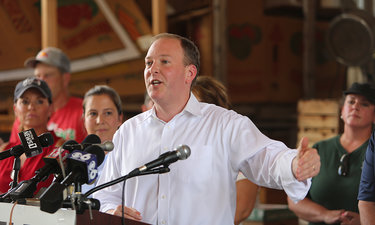Reardon: Lower threshold for farm workers’ overtime pay
Over the course of a decade, farm workers statewide will see the threshold for overtime pay lowered until it reaches 40 hours a week, down from the current 60.
Today, Roberta Reardon, the state’s labor commissioner, issued an order accepting the recommendations made by the Farm Laborers Wage Board, in a 2-to-1 vote, on Sept. 6.
After two years with 14 public meetings and hearings, the board submitted a report to Reardon along with its recommendation.
Senate Republican leader Rob Ortt immediately issued a statement, saying, “By approving this recommendation from a board composed of unelected bureaucrats, this mandate will devastate family farms still reeling from the pandemic. It is clear Albany’s one-party ruling class doesn’t care about family farms and seems hell-bent on destroying agriculture in New York State.”
Donna Lieberman, executive director of the New York Civil Liberties Union, issued an equally predictable statement: “Farmworkers have waited over 80 years for an end to the racist exclusion that has stolen countless hours of overtime pay …. Now, New York’s agriculture industry will no longer be able to use an overtime loophole to build their business plans on the backs of Black and Brown workers.”
On Sept. 6, the Wage Board’s chairwoman, Brenda McDuffie, former president of the Buffalo Urban League, and member Denis Hughes, former president of the New York State AFL-CIO voted, without comment, in favor of the recommendation.
However, David Fisher, president of the New York Farm Bureau, was against the measure and read a lengthy statement expressing his objections to the report. The other two board members agreed to Fisher’s request to add his concerns to the report; they make up two-and-a-half pages added to the end of the 19-page report as an addendum.
The wage board was created by the Farm Laborers Fair Labor Practices Act of 2019, which for the first time made farm workers eligible to join a union, take off one day a week, and earn overtime at one-and-a-half times their regular rate for any hours worked over 60 in a week. The board’s work has now ended.
In announcing her order, Reardon called the process “inclusive” and released this statement: “I come from a farm community myself, so I know how important the agricultural sector is to the New York State economy. Based on the findings, I feel the Farm Laborers Wage Board’s recommendations are the best path forward to ensure equity for farm workers and success for agricultural businesses.”
Albany County, according to the latest United States Department of Agriculture Census, from 2017, has 440 farms; 94 percent are family farms, and 26 percent hire farm labor.
Those are similar to statewide numbers: Of the 33,438 farms in New York State, 96 percent are family farms; 27 percent hire farm labor.
While the Wage Board deliberated in 2022, the state legislature enacted three new tax credits to help farm employers as they moved to the new standards, including a new refundable tax credit for overtime hours paid by farm employers.
Also, the Investment Tax Credit was increased from 4 percent to 20 percent for farm businesses and the Farm Workforce Retention Tax Credit was increased to $1,200 per employee.
Reardon accepted all three of the Wage Board’s recommendations:
— Reducing the overtime threshold from 60 to 40 hours per week;
— Phasing in the reduction over 10 years with reductions of our hours on a biannual basis; and
— Scheduling the reductions this way — on Jan. 1, 2024, the threshold is set at 56 hours; on Jan. 1, 2026, the threshold is set at 52 hours; on Jan. 1, 2028, the threshold is set at 48 hours; on Jan. 1, 2030, the threshold is set at 44 hours; and on Jan. 1, 2032, the threshold is set at 40 hours.
The state’s labor department will now undergo a rule-making process, including a 60-day comment period, with details posted on the department’s Farm Laborers Wage Board webpage.



